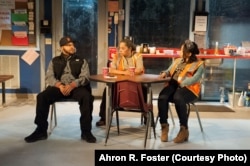Since the first U.S. cars began rolling off assembly lines in the early 20th century, Detroit, Michigan, has been the center of the U.S auto industry, home of the Big Three automakers, General Motors, Chrysler and Ford.
Today, Michigan still produces more cars and trucks than any other state in America, and this year, U.S. automakers are expected to sell a record number of vehicles.
But it's hard to forget 2008, when the U.S. government was forced to bail out two big players, GM and Chrysler, and the third, Ford, needed a government line of credit to get by.
During that time, the Motor City, as its known, lost hundreds of thousands of jobs as auto plants and their suppliers downsized or closed.
Now, a new play, running off-Broadway, looks at four African-American automobile workers struggling in the declining economy.
Called Skeleton Crew, it's the latest of three plays Dominique Morisseau has written about her hometown, and it received a special citation at this year's Obie Awards for off-Broadway theater.
It takes place in a drab break room in a stamping plant, where workers manufacture parts for the big three auto makers. But times are tough. The factory has laid off a lot of people and the ones who remain are the skeleton crew, the bare minimum needed to keep the plant going.
“It’s exploring a group of workers, a family of workers," Morriseau told WNYC earlier this year, "who sort of have to deal with the different impacts that this potential closing will have on them."
A hometown tale
It's all very personal for Morriseau.
“I’m from Detroit," she explained. "I was born and raised there and, uh, you know, I wanted to explore three eras in my city’s history that I felt were transformative, that changed the landscape of the city. But also, I just wanted to learn more about the people that were living through some of the crises that happened."
So she went home to talk to people about what it felt like to be in Detroit in 2008, when the auto industry was on the verge of collapse. For the workers in Skeleton Crew, it’s an earth-shaking moment. Director Ruben Santiago-Hudson said Morisseau is able to portray her characters with a specific kind of empathy.
“This play is really important, in the sense that you come into the world of blue collar life," Santiago said. "So, to go and see the integrity of these people and also how they feed off each other – they’re so, all different and they all need each other."
"You gotta make yourself irreplaceable," a character called Shanita stated. "That’s what I’m doing."
Her co-worker Faye is skeptical. "How you figure you irreplaceable? I been from stampin’ doors to installing shocks to them seven years I spent sewing interiors. Ain’t nobody in this plant more irreplaceable than Faye Davis is!"
Everyone's replaceable
But, as Skeleton Crew goes on, all the characters learn just how replaceable they are, from the supervisor, who could lose his house; to the worker, who might have to take a lower-paying job, right as she’s about to have her first baby; and finally to shop steward, Faye, who has been making cars for her entire adult life, and is now living in one.
Morriseau was thinking of the actress Lynda Gravatt when she wrote the part of Faye.
“She is as vulnerable as she is strong," Gravatt said of Faye. "And life has beaten her and she hasn’t quite figured out how to negotiate how life has beaten her or why it has beaten her. So, she, you know, just spends her money going to casinos … which many people do."
And, in a way, Skeleton Crew examines how the financial crisis in Detroit, and in the country, creates personal crises.
Santiago-Hudson said those crises feel and sound real.
“Dominique hears the language of her life, of her community," the director said. "And she not only hears it, she relays it just the way she heard it. And it takes a certain amount of courage, ‘cuz everybody wants to dilute and everybody wants to sanitize. She’s not trying to sanitize; she’s just trying to let you experience them."
And, hopefully, feel for her characters’ predicament, their pride and their resilience.






